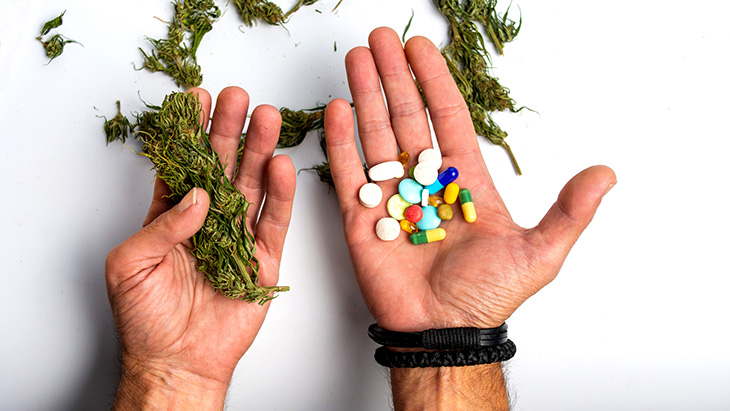
Nearly one in two Canadian patients authorized to access medical cannabis products say that their use of marijuana has enabled them to either reduce or cease their consumption of other controlled substances, particularly opioids and alcohol, according to data published in the Journal of Cannabis Research.
A team of researchers from Canada and from the United States surveyed 2,697 Canadian patients enrolled in the nation’s federal medical marijuana program, which began over two decades ago. (Canada separately legalized the possession and retail sale of marijuana for adults in 2018.)
Investigators reported that 47 percent of respondents acknowledged substituting cannabis for other controlled substances. Of those who said that they used cannabis in place of prescription medications, half acknowledged doing so for opioids – a finding that is consistent with dozens of other studies. Many respondents also reported using cannabis to reduce their alcohol intake, a finding that has also been previously reported in other studies.
About one-third of respondents did not inform their primary care providers that they were engaging in drug substitution.
Authors concluded: “This study examined patient-provider communication patterns concerning cannabis use and substitution in Canada. Results suggest that patients often substitute cannabis for other medications without PCP guidance. The lack of integration between mainstream healthcare and medical cannabis could likely be improved through increased physician education and clinical experience. … Future studies should investigate strategies for effectively involving PCPs in patient care around medical cannabis with specific focus on substitution and harm reduction practices.”
Commenting on the findings, NORML’s Deputy Director Paul Armentano said: “Cannabis has established efficacy in the treatment of multiple conditions, including chronic pain, and it possesses a safety profile is either comparable or superior to other controlled substances. So it is no wonder that those with legal access to it are substituting cannabis in lieu of other, potentially less effective and more harmful substances. As legal access continues to expand, one would expect the cannabis substitution effect to grow even more pronounced in the future.”
Other studies have shown that patients also frequently reduce their consumption of benzodiazepines, sleep aids, and antidepressants following medical cannabis initiation.
Full text of the study, “Healthcare provider and medical cannabis patient communication regarding referral and medication substitution: The Canadian context,” appears in the Journal of Cannabis Research. Additional information is available from NORML’s fact-sheet, ‘Relationship Between Marijuana and Opioids.’
Related
Medical Disclaimer:
The information provided in these blog posts is intended for general informational and educational purposes only. It is not a substitute for professional medical advice, diagnosis, or treatment. Always seek the advice of your physician or other qualified healthcare provider with any questions you may have regarding a medical condition. The use of any information provided in these blog posts is solely at your own risk. The authors and the website do not recommend or endorse any specific products, treatments, or procedures mentioned. Reliance on any information in these blog posts is solely at your own discretion.






